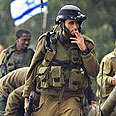
IDF soldiers in Gaza (Archive photo)
Photo: AP
“Soldier, I hope you get to die for Kiddush HaShem” (part of a letter attached to one of the packages we received from the home front)
The phone rang Saturday night, January 3rd, 2009. More than two years of intensive preparations ended when a pre-recorded message ordered us to immediately report to the pick-up location next to our home.
We packed quickly, we promised our partner that we will be back soon, we kissed our babies, and we left. Despite the concerns, there was no doubt in our mind: This is the real thing; no longer a mission to accompany yeshiva students heading out to the springs of Mount Hebron or securing eccentrics in Samaria. The time has come to lift the threat on southern residents and pulverize Hamas.
As opposed to the custom at our squad, at those moments we did not have the regular debates between the leftists and the settlers. All of us believed in the righteousness of this mission.
The army we encountered when we reached the emergency warehouses was better equipped, better organized, and better trained than we have ever seen. It was light years away from the horror stories we heard from our friends who were called up to the war in Lebanon two and a half years ago. Our unit was operating like a well-oiled machine, and we felt that this time around there was somebody to count on.
Yet regrettably, soon after, we were also asked to rely on a much more abstract entity – our Father in the heavens.
Along with a rifle and a protective vest we also received books of Psalms, copies of the traveler’s prayer, and Kabbalah books handed out by black-clad individuals inside and outside the base who appeared to take an active part in the enlistment process. Yet the truly great shock hit us during a short break in a training session: A friendly looking man wearing a uniform and officer’s ranks stood at the center of our platoon and proceeded to lecture about “Jewish fighting spirit” before we head into battle.
While according to all operational plans our ground incursion was supposed to be accompanied by tanks, gunships, and artillery, the speaker (who we later discovered was a member of the “Jewish awareness division” in the IDF Rabbinate) promised that we shall in fact be protected by a convoy of heavenly angels.
From that point onward, we “enjoyed” a tight Torah escort, which at times appeared to be an inseparable part of our combat procedures. The IDF’s Chief Rabbi, Avichai Rontzki, who has already reserved his place as one of the best fighters in the IDF, chose to speak to us of all things about the battle between David and Goliath. Ironically enough, Rontzki chose to mention the story of Hannah and her seven sons on the very day where a Palestinian home, with children inside it, was destroyed.
Members of the Chabad-Lubavitch movement also honored us with their presence. They deployed at the center of the base and walked around with no interruption near coded maps and classified satellite photos. While handing out food, the Lubavitcher Rebbe’s emissaries delivered some Torah lectures to the hungry fighters. Regrettably, even a direct request to the commanders at the base to put an end to this religious conversion festival failed to stop those brave fighters of God.
The particularly unpleasant grand finale came from the battalion’s rabbi, who spoke to us following the ceasefire declaration and opened with the story of the Binding of Isaac, telling us about Abraham who chose to sacrifice his only son, just like we are willing to sacrifice ourselves.
There is a problem with the growing tendency to provide religious elements with a monopoly on values and fighting spirit, and particularly with the legitimacy granted to organizations with a missionary and messianic character to operate amongst the soldiers. Most of the commanders in our division are religious, yet up until the last war there was complete separation between their private world and their military position.
If we fail to clearly draw the line right now, in a few years we shall find ourselves shifting from wars of choice or no-choice to holy wars.
The writers are infantry reserve fighters called up to serve in the Gaza war















